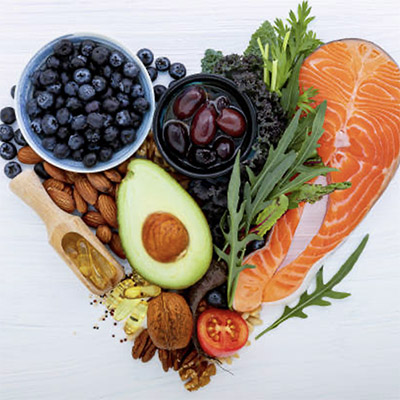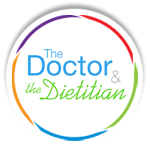 Mikayla Grogan, Marketing Assistant, with Marion Hauser, MS, RD
Mikayla Grogan, Marketing Assistant, with Marion Hauser, MS, RD
Eating too much of the wrong kind of fat can be detrimental to your health. Remember, not all fats are created equal and not all fats are bad. Some are healthier for your heart and overall health than others, but how can you tell the difference?
We so often hear the word “fat,” and it automatically has negative connotations. However, we can put food “fats” into two categories. Fats that are harmful to your health and fats that are essential to your health.
The late 1980’s became known as the “low-fat and jazzercise” era! Funny, right? But store shelves were stocked with SnackWell’s (and other fat-free snacks), and people were walking around in spandex leotards and leg warmers! People no longer consumed butter or eggs, and switched to fake fats such as margarine, which is one molecule short of plastic! Yup! The American Heart Association was strongly recommending low fat diets to prevent and treat heart disease. Once we were told “fat is bad” what happened? The American public gorged on foods high in sugar and carbs, eating boxes upon boxes of SnackWells! ☹ They were wrong, and the people are paying for it.
Harmful fats are trans fats which are found in fast, fried, and snack foods. These “seed oils” are highly toxic, even worse than sugar, and should be avoided at all costs. These kinds of fats increase your risk of developing chronic diseases and induce systemic inflammation in the body. Trans fats are large and dense which means as they build up in your body over time, they can become extremely toxic, and it takes a good chunk of time for them to detox from the body – even up to 6 years to rid your body of these toxic fats. As we like to say, it’s time to dump the junk!
Good fats can come from both unsaturated and saturated fats and can be beneficial to your overall health. Healthy fats are found in things like EVOO (organic, cold pressed, extra virgin olive oil), fatty fish like salmon, trout, and tuna, avocados, and organic sesame, pumpkin, sunflower seeds, nuts, especially macadamia, cashew, and hazelnuts, and much more! Grass-fed butter also contains high amounts of unsaturated fats, along with high levels of Vitamin K which promotes bone and heart health.
Unfortunately, we need to caution you on your fish purchases. Farmed fish, especially farmed salmon, is best avoided altogether due to toxic levels of hazardous materials, including PCBs and dioxins, pesticides, and antibiotics. We purchase our delicious salmon flash frozen from a Wild Alaskan website. Living in SW FL we can also purchase fresh fish that has been caught in the Gulf and delivered right to the docks – cannot get much fresher than that. Check your seafood source!
Again, we caution you to realize that you get what you pay for. Many seed oils, even EVOO, have been heavily processed and adulterated. We order our olive oil from specialized olive oil sources that come directly from Italy, Greece, etc. and are processed organically. Some regular grocery stores also carry these, as well as Amazon and other websites.
Saturated fats are good for you – especially if you are of the protein/fat-based Hauser Diet Type, such as the Otter or Lion Types which require higher fat content in their diets. Research now suggests that saturated fat is not linked to heart disease as experts once thought. But not all saturated fat is good. Use ghee and grass-fed butter vs above mentioned seed oils when cooking. Coconut oil is also a good choice. Be careful when eating in restaurants because nearly all of them use massive amounts of toxic oils to cook with, as well as put in their sauces and dressings.
Foods that contain good fats contain building blocks for our hormones, brain, and nerve tissue. By eating foods with good fats, you are giving your body the fatty acids it needs to grow and produce new cells and hormones – the opposite of saturated fats. They help your body to heal and replenish cells! This means they can lower your risk of developing heart disease, help maintain blood sugars, reduce inflammation, balance, and regulate hormones, and improve lipid profiles.
Good fats can also aid the metabolism! Again, we often hear “fat” and think that if we cut fatty things from our diet that we can lose weight, and this is where we are wrong. Good fats can increase metabolism, allowing your body to digest them more easily and turns them into fuel rather than storing it. When consistently using healthy fats, your body is trained to use the fat as a preferred energy source.
Like all foods we eat, moderation is key here! All in all, steer clear of fried, processed foods and fill your plate with whole, fresh foods!



